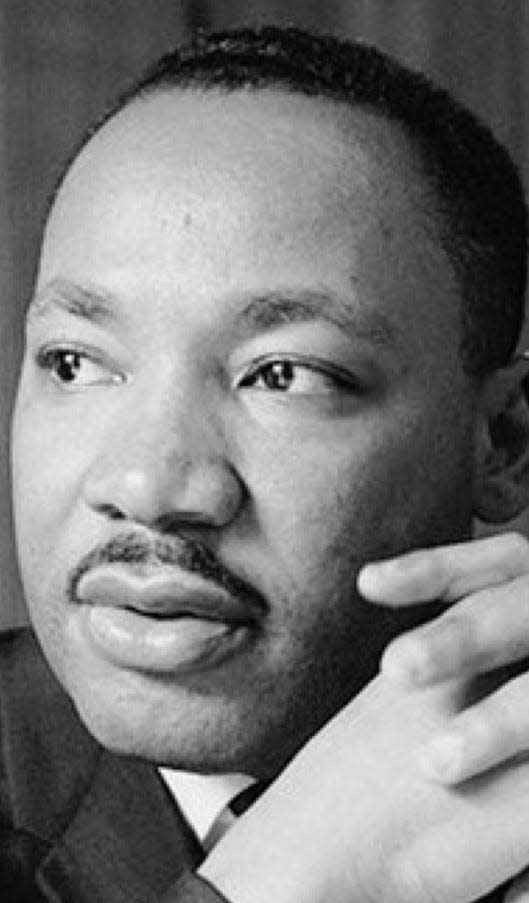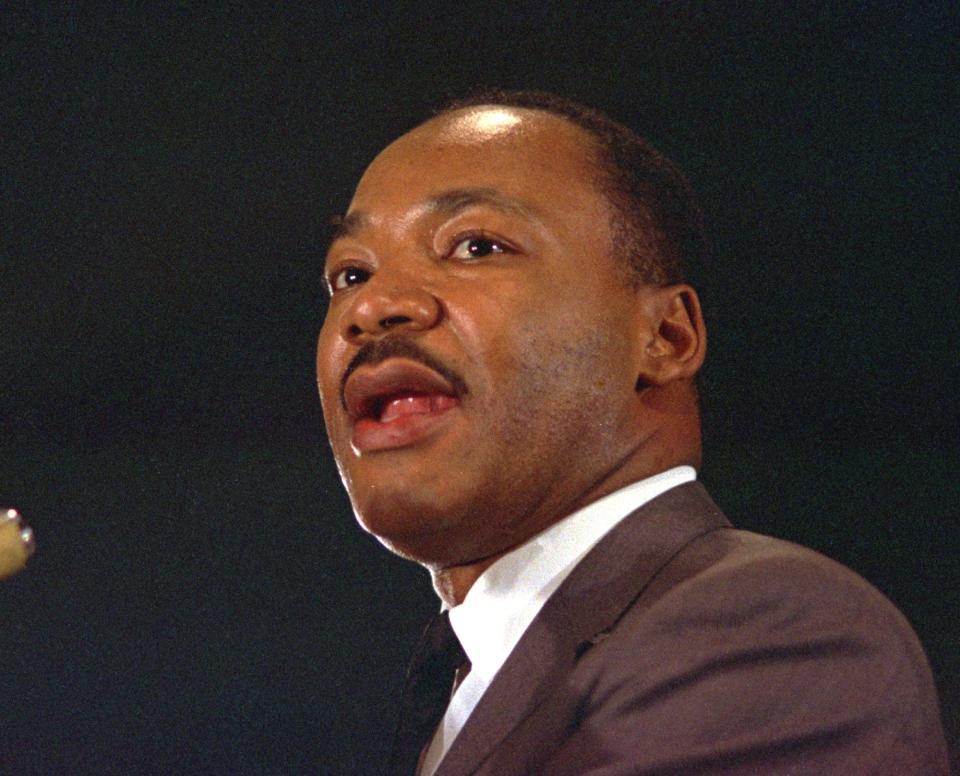5 thought-provoking quotes from Martin Luther King's most memorable speeches
- Oops!Something went wrong.Please try again later.
Inarguably one of the most iconic orators of the 20th century, Martin Luther King Jr. is known for his stentorian delivery of powerful, profound messages.
Whether opposing the Vietnam War or dreaming of a world in which people of all colors walked hand-in-hand as brothers and sisters, King left a lasting impression through his vast archive of sermons, speeches and writings.
More: What's closed on the Martin Luther King Jr. holiday
Here are quotes from five of his most memorable speeches.
"Give Us the Ballot," delivered at the Prayer Pilgrimage for Freedom, Washington, D.C., May 17, 1957:

"Give us the ballot, and we will no longer have to worry the federal government about our basic rights. Give us the ballot and we will no longer plead to the federal government for passage of an anti-lynching law; we will by the power of our vote write the law on the statute books of the South and bring an end to the dastardly acts of the hooded perpetrators of violence. Give us the ballot and we will transform the salient misdeeds of bloodthirsty mobs into the calculated good deeds of orderly citizens."
Source: The Martin Luther King Jr. Research and Education Institute at Stanford University.
“I Have a Dream,” Aug. 28, 1963 - the speech that remains King's most famous:
"Let us not seek to satisfy our thirst for freedom by drinking from the cup of bitterness and hatred. We must forever conduct our struggle on the high plain of dignity and discipline. We must not allow our creative protests to degenerate into physical violence. Again and again, we must rise to the majestic heights of meeting physical force with soul force. The marvelous new militancy, which has engulfed the Negro community, must not lead us to a distrust of all white people, for many of our white brothers, as evidenced by their presence here today, have come to realize their destiny is tied up in our destiny."
Source: History.com.
More: What you didn't know about King's 'Dream' speech
"The Quest for Peace and Justice," Nobel Peace Prize lecture, University of Oslo, Dec. 11, 1964:

"...I have the personal faith that mankind will somehow rise up to the occasion and give new directions to an age drifting rapidly to its doom. In spite of the tensions and uncertainties of this period something profoundly meaningful is taking place. Old systems of exploitation and oppression are passing away, and out of the womb of a frail world new systems of justice and equality are being born. Doors of opportunity are gradually being opened to those at the bottom of society.
The shirtless and barefoot people of the land are developing a new sense of “some-bodiness” and carving a tunnel of hope through the dark mountain of despair ... Here and there an individual or group dares to love, and rises to the majestic heights of moral maturity. So in a real sense this is a great time to be alive. Therefore, I am not yet discouraged about the future."
Our view: Martin Luther King Day is not time for rest and relaxation
Source: The Nobel Prize
"Beyond Vietnam: A Time to Break the Silence," Riverside Church, New York City, April 4, 1967:
"Somehow this madness must cease. We must stop now. I speak as a child of God and brother to the suffering poor of Vietnam. I speak for those whose land is being laid waste, whose homes are being destroyed, whose culture is being subverted. I speak of the— for the poor of America who are paying the double price of smashed hopes at home, and death and corruption in Vietnam. I speak as a citizen of the world, for the world as it stands aghast at the path we have taken. I speak as one who loves America, to the leaders of our own nation: The great initiative in this war is ours; the initiative to stop it must be ours."
Source: American Rhetoric Online Speech Bank
"The Other America," Stanford University, April 14, 1967:
"... if we are to have a truly integrated society, men and women will have to rise to the majestic heights of being obedient to the unenforceable. But after saying this, let me say another thing, which gives the other side. And that is that although it may be true that morality cannot be legislated, behavior can be regulated. Even though it may be true that the law cannot change the heart, it can restrain the harvest. Even though it may be true that the law cannot make a man love me, it can restrain him from lynching me, and I think that’s pretty important also. And so while the law may not change the hearts of men, it can and it does change the habits of men. And when you begin to change the habits of men, pretty soon the attitudes will be changed."
Source: Veterans of the Civil Rights Movement
This article originally appeared on The Columbus Dispatch: Quotes from five speeches by Martin Luther King Jr.

